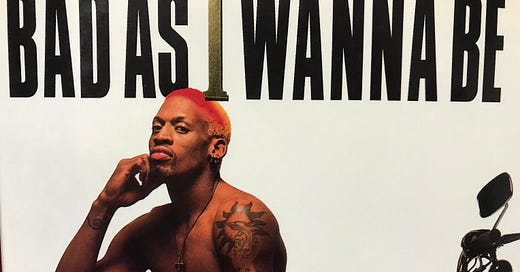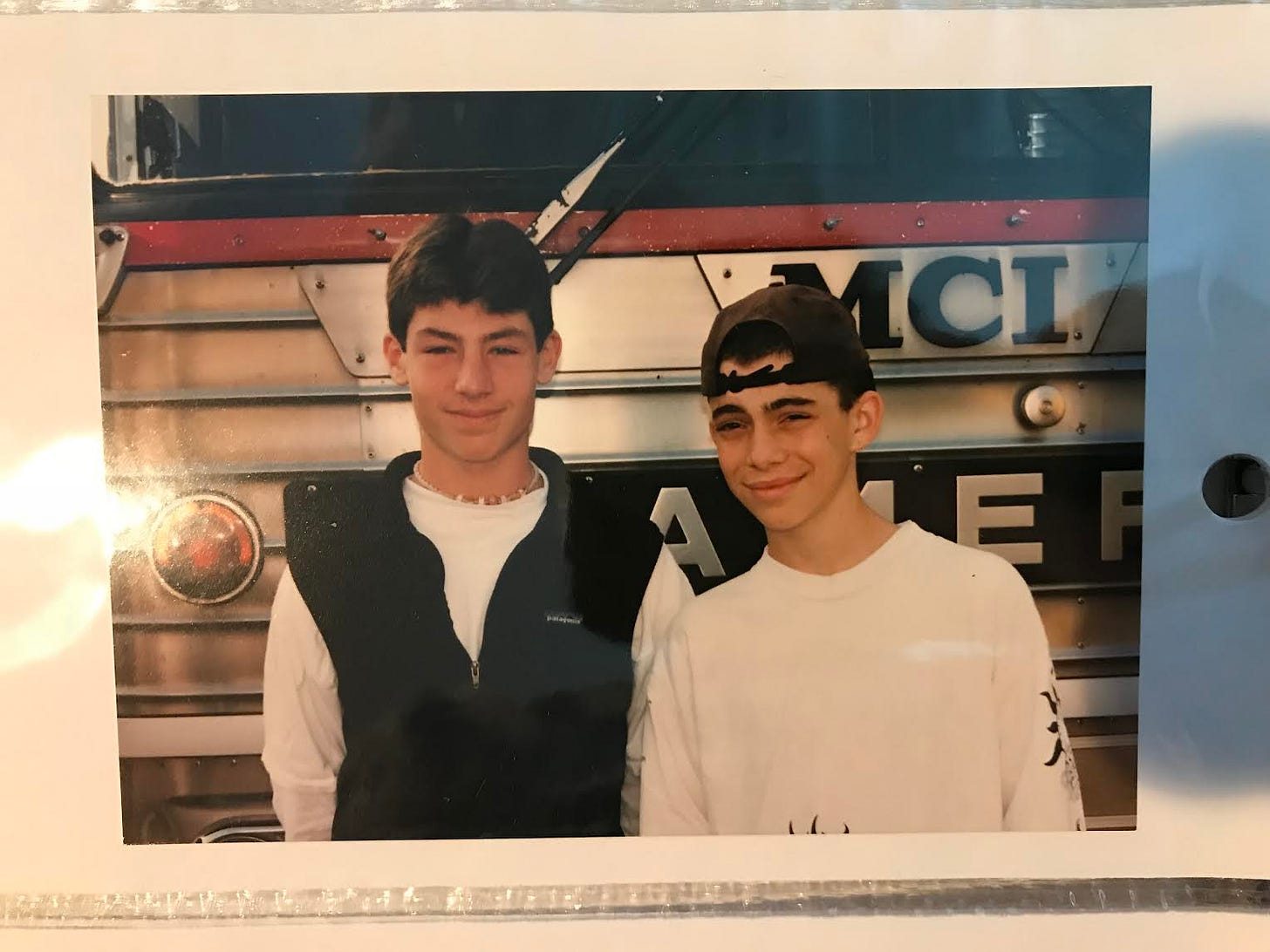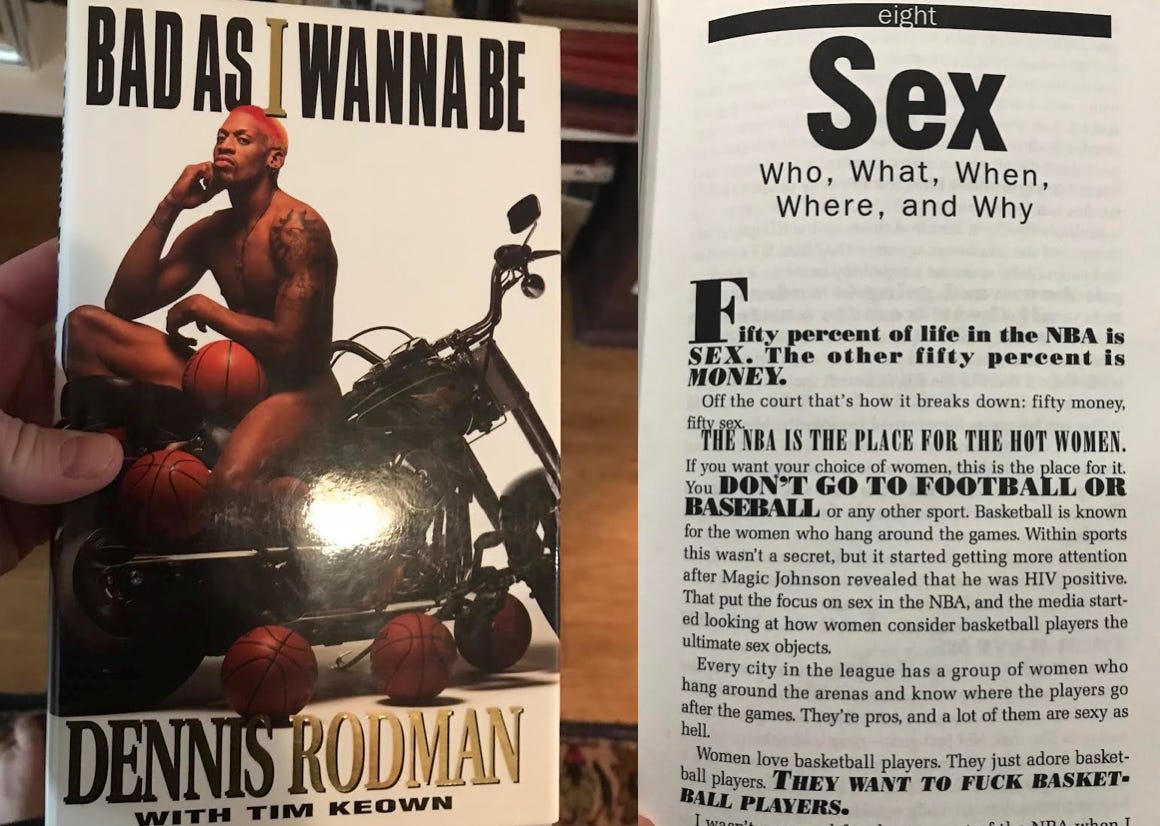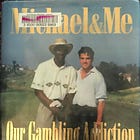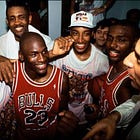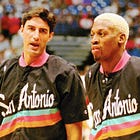"Bad As I Wanna Be" — the media chaos of Dennis Rodman's bestselling memoir
How Rodman and the Bulls made each other even bigger stars.
“I introduced them to Dennis the other day. I said, ‘I hope you don’t think Dennis is a role model.’ And Marcus said, ‘Yeah, I want red hair.’ I said, ‘Nah, no red hair, no earring.’ I think they’re fascinated by some of the things they see from kids at school or other kids. But every question they’ve had about him, I corrected them.”
— Michael Jordan, May 1996, on sons Jeffrey, 7, and Marcus, 5, meeting Dennis Rodman
My parents had to draw the line somewhere. I had his jersey. I had his before-it-was-illegal tattoo shirt. I had his zipper shoes. I had his poster, then another. I had all four of his color-changing McDonald’s cups (“Collect Them All!”), his three Sports Illustrated covers on my bedroom wall and the often accompanying two-page inserts.
To my grandfather’s dismay, and I guess Michael Jordan’s, I even had an earring. This wasn’t because of him (my friends and I asked our parents in 6th grade if we could get our ears pierced, and they all agreed to let us do so after 8th grade graduation, which just so happened to be the end of his first year with the Bulls) but you try telling that to Mort Pierce. “You know,” I said, “it’s not just him. Michael Jordan has one too.”
Papa wasn’t buying it. But my parents didn’t care. A promise was a promise. That wasn’t their line.
No, when it came to their 14-year-old son’s Dennis Rodman fandom, Mickey and Charlie Silverstein drew the line at one place and one place only: Dennis Rodman’s 1996 memoir Bad As I Wanna Be. This is the Horace Grant of controversial Bulls books: clearly not the #1 (The Jordan Rules), clearly not the #2 (Michael & Me), clearly the #3. Rodman had a lot to say about Grant in the book, matter fact, but his complimentary pronouncements for his power forward predecessor aren’t what landed the book on the Silverstein family banned list or the New York Times bestellers list.
What achieved both were his frank discussions of sex, sex and more sex. That is: sex (with everyone), sex (with Madonna) and more sex (gender roles in men’s professional sports).
“Fifty percent of life in the NBA is SEX. The other fifty percent is MONEY.”
That’s how Rodman opens chapter 8 of Bad As I Wanna Be, in that exact style: bold font, and “SEX” and “MONEY” in all caps. It’s the literary equivalent of Rodman’s personality and impact. A question of whether the best team of the first three-peat could beat the best of the second three-peat remains among the most enjoyable, unsolveable debates of Chicago sports history. Depends mostly on personal taste.
On the matter of fame and The Circus, though, there is no question: the second three-peat, for so many reasons, blows away the first. And the first three-peat was the biggest, most famous team in professional sports, a merchandise and pop culture powerhouse.
That’s how great the spotlight was on the second three-peat, starting immediately in 1996. In Scottie Pippen, we had arguably the second best player in the league. (It’s true.) And in Dennis Rodman, we had arguably the second second biggest image in the league, trailing only MJ and arguably Shaq from a marketing-and-visibility level.
Incredibly, for a person who would star in two movies and his own MTV show, endorse McDonald’s, get a Nike shoe deal, wrestle in the WWF and WCW and see a sponsor cancel a billboard because it was literally stopping traffic, Dennis Rodman’s biggest pop cultural moment was from that earliest of entertainments: a book.
The seeds of Bad As I Wanna Be were planted the year before, when Sports Illustrated pegged the then-Spurs forward for a postseason feature story. In his second season on the Spurs, despite missing 33 games mostly to a team suspension to start the season and a motorcycle shoulder injury in March, Rodman won his fourth straight rebounding title, was 1st team All-Defense for the sixth time in seven years and was 3rd team All-NBA. The Spurs went an NBA best 62-20 and David Robinson won league MVP. Rodman was the only other Spur to receive an MVP vote (he received three total votes, including one 2nd place vote)…
…all of which intensified the spotlight on his personality and personal life, all of which was on full display in Michael Silver’s landmark S.I. feature. The writer and the basketball player talked on a flight from Vegas to Houston, and then sat together another hour in the airport bar watching the Rockets knock off the Suns in Game 7 to advance to face the Spurs while discussing Rodman’s fantasies — sex with a man, killing someone, killing himself — and his realities: his friendship with Eddie Vedder and his now-ended relationship with Madonna who, per Dennis, wanted to have his baby.
The photo was just as memorable. Silver describes Rodman’s outfit as “a shiny tank top, metallic hot pants and a rhinestone dog collar.” He sat, holding a blue macaw that Silver describes as among “15 exotic birds.” The photo was just as iconic as the article, and wouldn’t you know it, S.I. chose it as their cover story. Rodman would later list Silver 6th in the acknowledgements for Bad As I Wanna Be, thanking him “for being the first person to show the world who Dennis Rodman really is.”
The cover story painted a clear picture of the difference between how the Spurs reacted to Rodman and how the Bulls reacted just a year later. The S.I. issue was May 23, 1995, the day Robinson was named MVP and between Games 1 and 2 of the 1995 Western Conference Finals, both of which the Spurs lost at home. Rodman’s magainze “distraction” received a significant portion of the blame, even though the Spurs tied the series at two.
The Rockets won the final two games of the series, Hakeem Olajuwon historically outplayed David Robinson and the relationship between Rodman and the Spurs (read: Robinson, coach Bob Hill and GM Gregg Popovich) disintegrated to nothing.
That was good luck for the Bulls, of course, while the Sports Illustrated issue’s popularity was good news for Rodman. As writer Alex Wong reports in his book Cover Story, in November of 1995, one month into Rodman’s time with the Bulls, his agent Dwight Manley parlayed that cover story into a book deal. Six months later the Bulls were 72-10, Rodman was rebounding champ and 1st team All-Defense for the seventh time (Jordan and Pippen were there too) and his memoir Bad As I Wanna Be was set to release in the midst of the team’s first round series with the Heat.
Unlike the Spurs’ reaction to the S.I. story, the Bulls largely laughed off any talk of a distraction from the team’s newest author.
“That doesn’t bother us,” Phil Jackson said May 1, 1996, about Rodman releasing and promoting the book. “What I told Dennis is if you were up on a ledge, all those guys would be telling you to jump because they’d love to see you do it.”
In other words, while Bob Hill’s goal with Rodman was always “keep him in line,” Phil Jackson’s goal was always “help him keep himself in line.” Bemused, muted replies might have been the norm in the locker room, but all around Rodman and the book, people were buzzing. On publication day, the day the Bulls would sweep Miami and the Tribune would gather enough material on the book to run on the entire back page of the sports, Rick Telander bumped into Manley, who was glowing.
“Two hundred thousand advance copies, biggest in sports history,” Manley told Telander, as Rick wrote in his 1996 book In The Year of The Bull. “Another hundred thousand ready to go. Oprah guaranteed a million sales to me.”
Rodman was a publisher’s dream. His media appearances included Dateline NBC with Stone Phillips and an emotional discussion with Oprah. More than those, though, what everyone remembers were two of his book signings: one in Chicago in May, the other in New York in August.
First, Chicago. On Saturday, May 4, 1996, the day before the Bulls kicked off their 2nd round series with the Knicks, a Rodman signing at Borders on 830 N. Michigan Avenue became a fan frenzy. Per the Associated Press, thousands of fans stretched six blocks around the book store, with Telander writing that the first ones had arrived 15 hours earlier.
Rodman arrived nearly two hours late, but when he arrived, he ARRIVED, pulling up on his Harley behind Chicago police officers (both driving and on horseback), decked out in heavy makeup, silver hair and a red feather boa. From Telander:
“This is insane, absolutely insane,” the AP quoted a 22-year-old Borders clerk. Borders regional manager Loreen Maxfield said that Rodman’s signing lasted more than three hours during which time he signed an astounding 1,400 books, a total so large that Maxfield had to contextualize it by saying it fell short of the record: 2,700 signed books by Colin Powell.
The next day, Rodman’s and the Bulls’ strong postseason continued. The team beat the Knicks in five games and then swept the Magic, with Rodman averaging close to 16 boards and 9 points per game, bringing crucial defense on Shaq in the ECF. In the Finals, Rodman twice tied Elvin Hayes’s record for the most offensive boards in a Finals game, with 11, grabbing 20 and 19 total in those two games and helping contain a powerful Shawn Kemp. The Bulls won their fourth championship in six seasons and Rodman’s star power transformation was complete.
The book kept selling. With its nude front and back cover (Oprah’s television audience caught an extended glimpse of Rodman’s rear), striking honesty and bold font design, Bad As I Wanna Be was an instant sports memoir classic, staying on a variety of bestseller lists through the end of the year. As much as Rodman was still the NBA’s bad boy, he was treated, to a degree, as a golden child. The media machine around him hummed along even when his ex-wife spoke about Rodman’s abuse.
“He left out the part where he beat my [butt],” Annie (Bakes) Rodman told Fred Mitchell, the dean of the Tribune sports section, upon the book’s release. “People should look at the court documents and our divorce papers. I can’t believe the people in Chicago are falling all over this guy. He pushed me down the stairs when I was pregnant in 1992 and I went on to have a miscarriage.”
Mitchell wrote about the incident and also discussed it with Telander, acknowledging that while the accusation was indeed still an allegation, Mitchell was not buying the “Dennis Rodman” that Rodman, Manley and even Oprah were selling.
“(His daughter’s) First Communion was on Saturday, and Rodman had his publicist call and say Dennis couldn’t make it,” Mitchell told Telander. “Annie and the daughter were here in Chicago, flown in for the Oprah show. But they didn’t come on because the girl was afraid.”
Rodman’s strained relationship with his daughter would play a central role in 1998 when he, in tears, walked off the set in the middle of an interview with Jim Gray for NBC. He had come to Chicago with baggage — among other items, news reports note that Annie Rodman had previously sued him in 1990 for physical abuse — and of course over the decades that followed his just three seasons on the Bulls, his story grew odder and odder.
But nothing could strip away his sheen in 1996. As the summer wore down and the new season approached, Rodman had another publicity stunt book signing set to pop. He appeared on David Letterman and claimed he was getting married the next day in Rockefeller Center. A bride did indeed show up at a Fifth Avenue Barnes & Noble. It was Rodman, in a white gown and yellow bangs.
“I stayed overnight in New York City,” one reader from New Jersey told Nassau Newsday. She was one of 1,000 people at the signing. “I want to see the color of his hair, maybe buy a book. I don’t know anything about basketball. I just think he’s cool.”
“It didn’t offend me in the least,” Rodman’s mother, Shirley, said in June about her son dressing in drag for his Chicago Borders appearance. “It surprised me, but I thought it was funny. But Dennis knows what he’s doing. He’s not stupid. He’s very smart and he has a lot of savvy about what he’s doing.”
Rodman’s Bulls honeymoon dwindled in 1997 but his marriage to Madison Avenue remained strong, starting when he showed up at the Oscars with Vivica A. Fox and then co-starred with Jean-Claude Van Damme in action-buddy-comedy Double Team. Yet even when he was in the doghouse with the Bulls, he was always much closer to the team’s warm fuzzy center.
For one thing, his view of Michael Jordan was vastly different than his view of David Robinson. “Dennis was like subservient to Michael in an emotional way, not a physical way,” Steve Kerr told Roland Lazenby for Lazenby’s MJ biography The Life. “He never did anything for Michael that he didn’t do for the rest of us, but there was just this understanding that Michael is the ‘greatest’ and I’m below him, and so I’m not going to mess with him, and vice versa. It was really interesting.”
Rodman’s views on Robinson, which he expressed in both Sports Illustrated and the book, were not nearly as cozy. Those views got buried under comments about Madonna, gay clubs and Rodman’s troubled youth, but if you were Robinson, Popovich and Bob Hill, that might well have been the bigger stuff.
In S.I., Rodman called Olajuwon the “best center in the game.” In the book, no longer Robinson’s teammate, Rodman unloaded on the 1995 MVP:
“Where was David in the Houston series? He got eaten alive by Hakeem Olajuwon that whole series. They asked me to guard Olajuwon, and I refused. Bob Hill came up to me and asked me if I would take Hakeem in the first half, and I said no. I would have taken him in the second half, but not the first. Any coach will tell you don’t put your best defensive player on the other team’s best offensive player in the first half. You put it all on the line in the second half. That’s how it worked with Chuck Daly in Detroit, and I know that’s how Phil Jackson feels in Chicago. …
“So if you want me to guard him in the second half, fine. David got into foul trouble against Hakeem just by falling down. David asked me for help, and I told him right to his fucking face, ‘I am not going down there.’ I was not going to help him. He didn’t say anything to me, because there was nothing he could say. Before those games, he looked so fucking scared in the locker room, he couldn’t stop shaking. … Never once did he say he could take him by himself. This guy was the MVP of the league, and they were paying him $8 million a year. He needed to step up and at least say he could do it by himself. He was supposed to be the one leading this team.”
Perhaps even more damning, Rodman wrote that after Game 2 of the Western Conference Finals, with the Spurs down 2-0 at home, point guard Avery Johnson addressed the team and most of management in the locker room, saying, “We can’t wait for David Robinson to take us, because he ain’t going to be there for us.”
“David Robinson was there,” Rodman wrote, “sitting right in the middle of everyone. When Avery was finished, David was still sitting there. He sat there and took it.” That sums up Rodman’s views on Robinson, and Bob Hill too, who Rodman said “wasn’t ready for the pressure of that kind of series.” Meanwhile, he complimented both Pippen and Jordan, the latter for his game, mentality and his control of his image.
But he saved his kindest compliments for Phil Jackson. He recalled his first preseason game with the Bulls in which he had what he called “a little temper tantrum.” The refs were out in a labor dispute, and a replacement ref called on Rodman what Rodman considered a ticky-tack foul. Rodman whipped the ball against the shot clock. The ref called a technical.
Rodman then instinctively looked to the Bulls bench. Bob Hill would have been ready to sub him out. But Phil Jackson was laughing. Later, when Rodman was battling an injury, Phil told him to take his time on his return.
“When I looked over there during that first exhibition game and saw him laughing as the ref was slapping a T on me, and when I read what he said about me coming back from injury, I couldn’t believe it,” he wrote. “I wasn’t expecting that. I wasn’t ready for that. Somebody understands? A coach who understands? One thought came to my mind:
“Finally.”
-
-
-
Great story from someone who was there! Thanks Brad!
-
-
-
JUNE 2025 UPDATE:
For the Chicago Reader’s Pride issue, I wrote about Dennis Rodman’s 1990s relationship with Chicago’s LGBTQ+ community. Read the story here.
Backstory on my story here:
Dennis Rodman's gay 90s
“You also had LGBTQ bars on the south side. … Jeffery Pub may have been one of the oldest Black gay clubs not only in Chicago but in the United States. … Everything that people were doing, whether it’s the drag queens or the gay clubs, the gay businesses, entrepreneurs, creative people—I thin…
-
-
-
More coming on “Bad As I Wanna Be.” Hope everyone is doing well!
And more on Bulls books:

